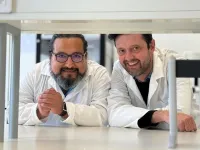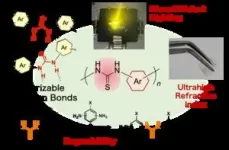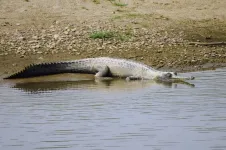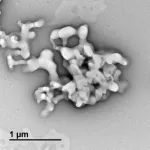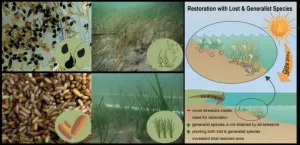(Press-News.org) Leuven (Belgium) 30/04/2024 - For the first time, researchers from VIB-KU Leuven, UZ Leuven, Janssen Pharmaceutica and multiple international collaborators have introduced quantitative methods and extensive confounder control to discover microbiome biomarkers in colorectal cancer development. While multiple microbial taxa have been put forward as potential cancer-associated biomarkers in the past, this new study uncovers obscured contributions that may have resulted in incorrect associations. The results have been published in Nature Medicine.
Cancer microbiome research has taken significant strides over the past decade, leading to new insights into cancer-associated biomarkers. Despite numerous scientific advances, previous research has focused on non-quantitative, descriptive biomarker discovery methods. Research led by the VIB-KU Leuven Center for Microbiology, UZ Leuven, and Janssen Pharmaceutica, now shows the risks of adhering to these methods. In their latest publication, they take microbiome confounders and absolute quantification into account, with surprising results.
For this pioneering study, the researchers combined Quantitative Microbiome Profiling (QMP) with extensive patient phenotyping from a group of 589 patients at various stages of colorectal cancer. In addition, they reanalyzed the data from fifteen published studies encompassing a total of 4439 patients and controls. The study revealed that in absence of confounder control, the results are equivalent to those stated by the authors of the published cohorts. However, when confounder control and absolute quantitative methods are incorporated, some previously claimed microbial biomarker associations are revealed to be driven by other factors rather than cancer diagnosis.
This study shows we must separate the wheat from the chaff when studying cancer-associated biomarkers. By implementing confounder control and quantitative profiling, we were able to reveal potential misleading associations between microbial markers and colorectoral cancer development, for example driven by intestinal inflammation. – Professor Dr. Jeroen Raes, PI and Vice-Director at VIB-KU Leuven Center for Microbiology and Rega Institute, Faculty of Medicine, KU Leuven.
The study identifies transit time, faecal calprotectin, and BMI as primary microbial covariates, surpassing the variance explained by traditional CRC diagnostic groups. Surprisingly, well-established microbiome-CRC targets, such as Fusobacterium nucleatum, fail to significantly associate with CRC diagnostic groups when controlling for these covariates. Instead, the study underscores the robust associations of Anaerococcus vaginalis, Dialister pneumosintes, Parvimonas micra, Peptostreptococcus anaerobius, Porphyromonas asaccharolytica, and Prevotella intermedia with CRC, highlighting their potential as future targets for intervention.
This research underscores the importance of rigorous methodologies in unraveling complex disease-microbiome associations. Many of the discovered targets have been mostly ignored until now. - Raul Yhossef Tito-Tadeo, first author and postdoc at the Raes Lab.
Our results show the importance of rigorous patient phenotyping. Collecting all this extra data in a study is a tremendous amount of work, but worth the effort. – Sara Verbandt, Research Manager at the Digestive Oncology Group, KU Leuven.
The clinical implications of this study are important. There is an high need for fast, non-invasive colon cancer diagnostics. Current screening tools (e.g based on the presence of blood in stools) are not specific enough and require too many unnecessary colonoscopies, putting unnessecary burden on the heathcare system.
Fast, specific stool tests will allow a much larger number of individuals to be screened early, avoiding many unnecessary colon cancer deaths. - Professor Dr. Sabine Tejpar, Gastro-enterologist at UZ Leuven, head of the Digestive Oncology group, and professor at the Faculty of Medicine KU Leuven.
END
Microbiome researchers challenge the state of the art in colon cancer biomarker discovery
New methodologies in unravelling complex disease-microbiome associations
2024-04-30
ELSE PRESS RELEASES FROM THIS DATE:
Unveiling nature's custodians: groundbreaking study highlights crucial role of scavengers in wetlands
2024-04-30
A pioneering study highlights the importance of carrion and scavengers in wetlands on a global scale. A study by researchers from the Ecology area of the Miguel Hernández University of Elche (UMH) and the Ecology department of the University of Alicante (UA) reveals the fundamental importance of scavengers and carrion in wetlands. The article, published in Biological Reviews, emphasizes that the benefits provided by scavengers far outweigh the potential drawbacks. Among their essential functions are the recycling and transportation of nutrients and the regulation of water quality, benefiting the entire ecosystem, from soil and plants to birds and mammals.
Historically, ...
Data scarcity challenges identification of endocrine disruptors
2024-04-30
As a result, the researchers recommend updating the information requirements in the EU legislation, REACH. They also propose various approaches for evaluating chemical substances to ensure that all available information is fully utilized.
Researchers from DTU National Food Institute and the University of Southern Denmark have screened the scientific literature for the Danish Environmental Protection Agency to find substances showing signs of endocrine disrupting properties and thus being potentially harmful to humans and ...
A significant portion of the world’s population continues to trust vaccines, says survey in 23 countries
2024-04-30
A substantial proportion of the world’s population remains willing to get vaccinated against diseases including COVID-19, according to a new survey across 23 countries that represent more than 60% of the world’s population. The study, published in Nature Medicine, was co-led by the Barcelona Institute for Global Health (ISGlobal), a centre supported by “la Caixa” Foundation, and the Graduate School of Public Health and Health Policy of the City University of New York (CUNY SPH).
The severe human impact of the COVID-19 pandemic led to the rapid research and development of safe and effective vaccines based on existing models, ...
Clumps of this molecule inhibit strep’s DNA-cleaving enzymes
2024-04-30
An entirely new approach to inhibiting DNA-cleaving enzymes works through the aggregation of an otherwise non-toxic molecule. This Kobe University discovery may lead to a much-needed method for curbing Streptococcus growth.
Enzymes are the body’s tools to make almost all reactions happen. But the same is true for bacteria like Streptococcus, which causes toxic shock syndrome, a rapidly progressing and deadly condition. When the body’s white blood cells try to capture the bacteria by casting nets made out ...
Cars as particles
2024-04-30
What do the flow of cars on a highway and the movement of bacteria towards a food source have in common? In both cases, annoying traffic jams can form. Especially for cars, we might want to understand how to avoid them, but perhaps we've never thought of turning to statistical physics, as Alexandre Solon, a physicist from Sorbonne Université, and Eric Bertin, from the University of Grenoble, both working for the Centre national de la recherche scientifique CNRS, have done. Their research, recently published in the Journal of Statistical Mechanics: Theory and Experiment (JSTAT), has developed a one-dimensional mathematical model ...
Let widgeongrass be a weed in the seagrass yard -- making seagrass restoration more resistant to rising temperatures using generalist grasses
2024-04-30
New research demonstrates that seagrass habitat restoration can be enhanced by including other grasses in addition to the declining or lost species and – ultimately – that restoration efforts must proactively select species that can withstand current and intensifying stressors driven by human activities and climate change.
Rising global temperatures combined with centuries of humans working within our seascapes has reshaped coastal ecosystems. Rebuilding or restoring coastal habitat is becoming ...
Group sales incentives boost weak brand sales, study finds
2024-04-30
New research co-authored by a UC Riverside business professor provides some sound advice for managers of retail outlets that limit their product selection to a particular brand: Managers should factor in the strength of their brand when structuring the pay incentives for their sales staff.
The study focused on what marketing scholars call “brand-managed” retail operations. These outlets include “stores within stores,” such as counters in major department stores with dedicated sales staff that offer just one brand of cosmetics such as Clinique. They can also be stores ...
The double-fanged adolescence of saber-toothed cats
2024-04-30
The fearsome, saber-like teeth of Smilodon fatalis — California's state fossil — are familiar to anyone who has ever visited Los Angeles' La Brea Tar Pits, a sticky trap from which more than 2,000 saber-toothed cat skulls have been excavated over more than a century.
Though few of the recovered skulls had sabers attached, a handful exhibited a peculiar feature: the tooth socket for the saber was occupied by two teeth, with the permanent tooth slotted into a groove in the baby tooth.
Paleontologist Jack Tseng, associate professor of integrative biology at the University of California, Berkeley, doesn't think the double fangs ...
COVID-19-induced financial hardships reveal mental health struggles
2024-04-30
When COVID-19 caused significant economic disruptions, thousands of people around the world experienced sudden shocks to their financial situation through reduced earnings or job losses.
Now economic researchers at the University of South Australia have examined the mental health effects on people who experienced immediate or expected financial setbacks during the height of the pandemic.
Data gathered from China, Japan and South Korea during the early phases of the pandemic revealed that the severe economic shocks induced by COVID-19 caused significant ...
Healthy lifestyle may offset effects of life-shortening genes by 60%+
2024-04-30
A healthy lifestyle may offset the effects of life-shortening genes by more than 60%, suggests an analysis of the findings from several large long term studies, published online in the journal BMJ Evidence Based Medicine.
While genes and lifestyle seem to have an additive effect on a person’s lifespan, an unhealthy lifestyle is independently linked to a 78% heightened risk of dying before one’s time, regardless of genetic predisposition, the research indicates.
The polygenic risk score (PRS) combines ...
LAST 30 PRESS RELEASES:
Yale study challenges notion that aging means decline, finds many older adults improve over time
Korean researchers enable early detection of brain disorders with a single drop of saliva!
Swipe right, but safer
Duke-NUS scientists identify more effective way to detect poultry viruses in live markets
Low-intensity treadmill exercise preconditioning mitigates post-stroke injury in mouse models
How moss helped solve a grave-robbing mystery
How much sleep do teens get? Six-seven hours.
Patients regain weight rapidly after stopping weight loss drugs – but still keep off a quarter of weight lost
GLP-1 diabetes drugs linked to reduced risk of addiction and substance-related death
Councils face industry legal threats for campaigns warning against wood burning stoves
GLP-1 medications get at the heart of addiction: study
Global trauma study highlights shared learning as interest in whole blood resurges
Almost a third of Gen Z men agree a wife should obey her husband
Trapping light on thermal photodetectors shatters speed records
New review highlights the future of tubular solid oxide fuel cells for clean energy systems
Pig farm ammonia pollution may indirectly accelerate climate warming, new study finds
Modified biochar helps compost retain nitrogen and build richer soil organic matter
First gene regulation clinical trials for epilepsy show promising results
Life-changing drug identified for children with rare epilepsy
Husker researchers collaborate to explore fear of spiders
Mayo Clinic researchers discover hidden brain map that may improve epilepsy care
NYCST announces Round 2 Awards for space technology projects
How the Dobbs decision and abortion restrictions changed where medical students apply to residency programs
Microwave frying can help lower oil content for healthier French fries
In MS, wearable sensors may help identify people at risk of worsening disability
Study: Football associated with nearly one in five brain injuries in youth sports
Machine-learning immune-system analysis study may hold clues to personalized medicine
A promising potential therapeutic strategy for Rett syndrome
How time changes impact public sentiment in the U.S.
Analysis of charred food in pot reveals that prehistoric Europeans had surprisingly complex cuisines
[Press-News.org] Microbiome researchers challenge the state of the art in colon cancer biomarker discoveryNew methodologies in unravelling complex disease-microbiome associations
